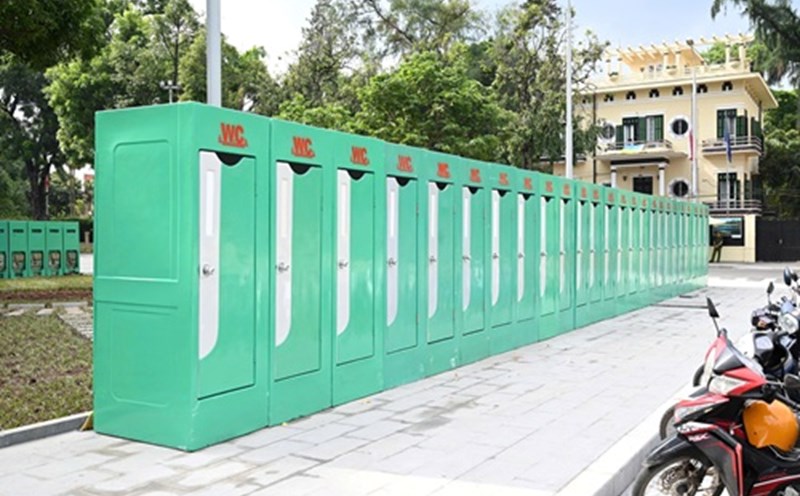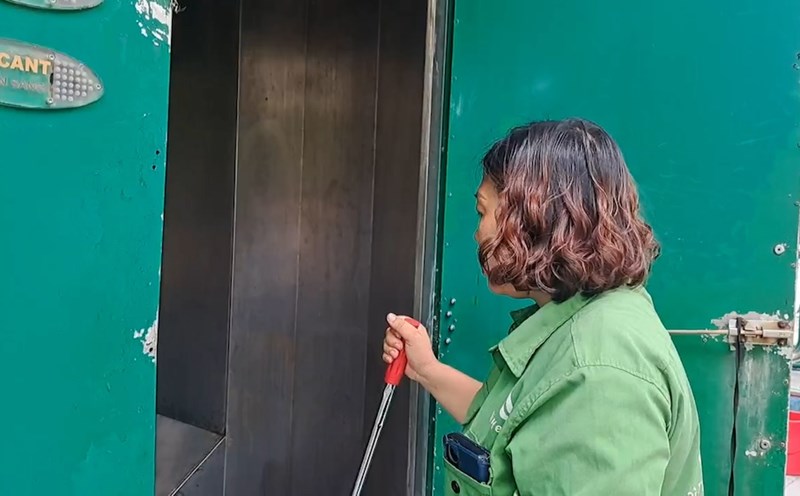In the process of building a civilized and modern urban area, public toilets are considered one of the basic utilities for people and tourists. However, current reality shows that not all public toilets can meet the needs well.
According to statistics, there are currently over 350 NVSCC in Hanoi; this number is too small, not covering the urban population density of approximately 8.7 million people. In particular, in the central areas of the capital such as Hoan Kiem, Ba Dinh..., the number of NVSCCs has not met the needs of people and tourists. At the same time, some NVSCCs are in a state of disrepair, with rotted and peeling steel shell toilets, affecting the urban landscape.

A representative of Hanoi Urban Environment Company Limited (Urenco) said that Hanoi currently has 2 types of NVSCC: brick and steel construction, 100% of which are free. Most of these NVSCCs were built before 1990 to serve the needs of sanitation in residential areas and are distributed in residential areas, collective housing areas, located in deep alleys. Up to now, all residential areas have been newly built and most of them have homemade toilets; only a few households do not have toilets and some people from other provinces still use these toilets for business, business and trading. The toilets built with bricks are mainly concentrated in areas such as Hoan Kiem, Hai Ba Trung and Ba Dinh... Therefore, to be clean, it needs to be rebuilt.
Steel NVSCCs were invested in and built by Hanoi City from 2003 to 2010, located in densely populated areas such as streets, public flower gardens, etc.; basically, are currently being maintained well to serve the people, have improved regular cleaning methods, are basically clean, ensure aesthetics and maintain spraying to avoid polluted odors, ensure hygiene. However, some are now degraded and rusted.
According to environmental experts, although it is a secondary project, public toilets are an essential service, contributing to improving the quality of life and attracting tourists. However, there is currently a shortage of NVSCC systems; at the same time, many places do not ensure hygiene. Many locations are very dirty, lack water, broken equipment, and are not cleaned regularly, causing fear for people.
NVSCC, something that people and tourists really need in places where community activities should be clean, civilized and convenient. According to the reporter of Lao Dong Newspaper, many NVSCCs are rusty, degraded, peeling, polluted and do not ensure urban aesthetics.

According to Mr. Nguyen Duc Hai, residing in Nam Trung Yen urban area, on Mac Thai To street (Hanoi), NVSCC is degraded and not cleaned regularly, so it is very foul-smelling, causing many people to not want to go even though it is free.
According to Ms. Vu Thi Hiep - a cleaning staff in the South Central Yen area, the toilets are cleaned regularly every day, but she alone manages 2 houses, so she has to run around; at the same time, some people's awareness when using them is also very low, littering causes unsanitary conditions, very uncomfortable.
Regarding this issue, Urenco representative said that to increase the quality of NVSCC service, it is necessary to upgrade and repair, or have a mechanism for socialization, and at the same time increase the unit price standard. Currently, it is very difficult to recruit workers to work here because of low salaries; to ensure income, a person must receive 2-3 points, so most of the employees working at NVSCC are former environmental workers on leave.

Urenco representative also said that currently, the management unit is only allowed to replace the bulb, while other repairs do not have funding, so it must report to the authorities for handling. Therefore, to improve the quality, it is necessary to renovate and upgrade existing NVSCCs; invest in building NVSCCs on main streets, flower gardens, tourist attractions, businesses and other public places that do not have NVSCCs; raise people's awareness; improve service quality; organize maintenance and promulgate operating regulations, regulations and instructions on the use and maintenance of NVSCCs; regulate the use and maintenance of NVSCCs; regulate the use of large commercial centers, restaurants (especially beer and beverage bars, bus stations, parks, markets... necessarily have NVSCCs for customers; regulate penalties for violating environmental sanitation...












